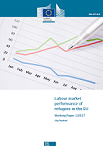Watt, Andrew, Andor, László, (2017), “Populism, Austerity And Democratic Deficit”, Social Europe, 23 Μαΐου Critiques of the European Union target a political problem – the so-called democratic deficit – and an economic (and social) one: austerity, sometimes subsumed under the broader heading of neoliberalism. It is also often claimed or simply assumed that there is a connection between the two: the first being the main cause of the second. Bureaucrats …Read More
Governance and Ownership of Significant Euro Area Banks
Véron, Nicolas, (2017), “Governance and Ownership of Significant Euro Area Banks”, PIIE, Μάιος European policymakers and analysts often appear to assume that most euro area banks are publicly listed companies with ownership scattered among many institutional investors, a structure in which no single shareholder has controlling influence and that allows for considerable flexibility to raise capital when needed. Such an ownership structure is indeed prevalent among banks in advanced countries such …Read More
Social Europe revisited
Bentolila, Samuel, Dolado , Juan, (2017), “Social Europe revisited”, Vox Eu, 23 Μαΐου Almost 20 years ago, the eighth CEPR Monitoring European Integration report explored the interactions between social policy, broadly interpreted, and economic integration in Europe. The experience of the past enlargement of the European Community to include Greece, Portugal, and Spain from the early to the mid-1980s provided Social Europe: One for All? (Bean, Bentolila, Bertola, and Dolado, 1998) …Read More
Debt Limits and the Structure of Public Debt
Pienkowski, Alex, (2017), “Debt Limits and the Structure of Public Debt”, IMF, 22 Μαΐου This paper provides a tractable framework to assess how the structure of debt instruments—specifically by currency denomination and indexation to GDP—can raise the debt limit of a sovereign. By calibrating the model to different country fundamentals, it is clear that there is no one-size-fits-all approach to optimal instrument design. For instance, low income countries may find benefit …Read More
Financial integration in Europe
ECB, (2017), “Financial integration in Europe”, ECB, Μάιος 2017 The ECB’s annual report on financial integration in Europe contributes to the advancement of the process of European financial integration by analysing its development and the related policies. For the ECB, the market for a given set of financial instruments and/or services is fully integrated if all potential market participants with the same relevant characteristics: (1) face a single set of rules …Read More
Determinants of FDI inflows in advanced economies: Does the quality of economic structures matter?
Dellis, Konstantinos, Sondermann, David, Vansteenkiste, Isabel, (2017), “Determinants of FDI inflows in advanced economies: Does the quality of economic structures matter?”, ECB Working Paper Series No 2066, Mάιος This paper investigates the role of economic structures as determinants of FDI inflows. We expand on the existing literature by focusing on advanced economies, using a newly available measure of FDI which cleans the data from statistical artefacts, such as financial round tripping, …Read More
The importance of being special: repo markets during the crisis
Corradin, Stefano, Maddaloni, Angela, (2017), “The importance of being special: repo markets during the crisis”, ECB, Μάιος 2017 Specialness – the premium of procuring a specific security in the repo market – increased in the second half of 2011 for Italian government bonds. We assess the impact on specialness of the outright purchase program of the Eurosystem during the same period. Bonds bought by the Eurosystem had higher specialness. The impact was …Read More
Does employment protection legislation affect credit access? Evidence from Europe
Moro, Andrea, Maresch, Daniela, Ferrando, Annalisa, Udell, Gregory F., (2017), “Does employment protection legislation affect credit access? Evidence from Europe”, ECB, Μάιος We investigate the impact of employment protection on firms’ credit access by looking at both credit obtained from banks and firms’ decision to apply for a loan. We find that greater flexibility in structuring the employees’ working hours and in dismissing employees increases the probability that firms obtain …Read More
What could a euro-area finance minister mean?
Wolff, Guntram B., (2017), “What could a euro-area finance minister mean?”, Bruegel, 17 Μαΐου With the election of Emmanuel Macron as president of France, the idea of a euro-area treasury and finance minister is back in the limelight. The election programme of Emmanuel Macron calls for “a budget for the euro area voted by a euro-area parliament and executed by a euro-area finance minister” with the aim to “be able to …Read More
Labour market performance of refugees in the EU
Peschner, Jörg, (2017), “Labour market performance of refugees in the EU”, Working Paper 1/2017, European Commission, Directorate-General for Employment, Social Affairs and Inclusion, 5 Μαϊου This paper analyses the individual and socio-demographic factors behind the low employment rate of refugees compared to individuals born in the EU but also compared to other migrants. It complements the 2016 Employment and Social Developments Review where a chapter was dedicated to the labour …Read More





